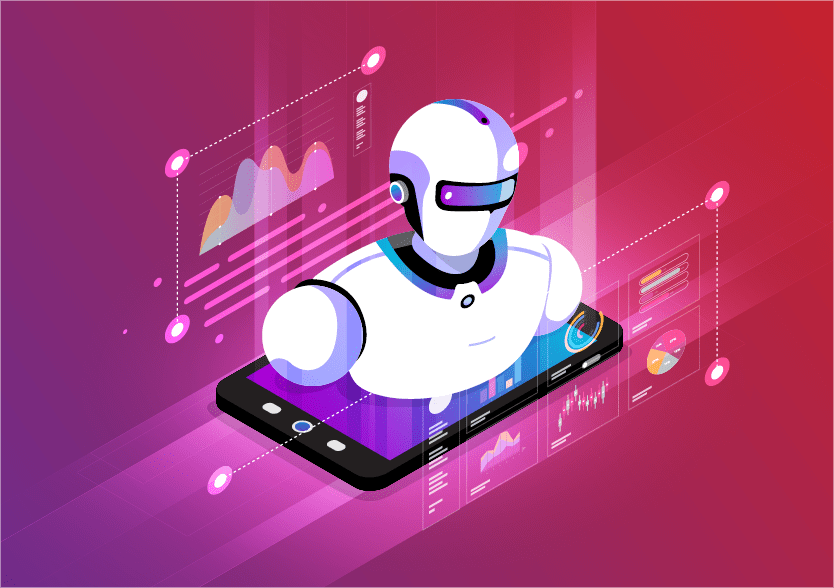Automate Routine Inquiries with Virtual Agents
Allow your contact center team to focus on more complex asks and let virtual agents handle the rest.

Help more customers with delightful and efficient self service
Give your customers the experience they deserve quickly, simply, and without having to press any buttons. IVR automation tools can provide:
- Enhanced Customer Service: Say goodbye to impersonal IVR menus. Allow your customers to interact with intelligent virtual agents that provide natural and human-like conversations.
- 24/7 Availability: Never miss a customer call, even after hours. Our virtual agents are always on, providing round-the-clock support, and freeing up your human agents to focus on more complex tasks.
- Efficiency and Cost Savings: Reduce operational costs by automating routine tasks and inquiries. Our virtual agents handle repetitive queries, leaving your live agents to tackle higher-value interactions.
- Data-Driven Insights: Gain valuable insights into customer behavior and preferences with SmartAction’s analytics. Use this data to make informed decisions, personalize customer interactions, and optimize your processes.
- Seamless Transition: Transitioning from traditional IVR to our virtual agents is a breeze. Our technology integrates effortlessly with your existing systems, ensuring a smooth and painless migration.

What Is a Virtual Agent?
If you’re reading this article you’re likely wondering, what is a virtual agent? This question is best answered by delving into its core functionalities. Virtual agents are programmed to understand human language inputs through text or voice commands and respond accordingly. As a virtual agent, the primary aim is to streamline customer interactions by providing instant assistance without the need for human intervention. As they continue to learn from each interaction using machine learning techniques, their efficiency and effectiveness improve over time.
A prime application of this cutting-edge technology is in contact centers where businesses often face challenges in managing high volumes of customer inquiries. Integrating a virtual agent for contact center applications can significantly reduce response times while maintaining quality levels that match or exceed those provided by human agents. This not only results in enhanced customer satisfaction but also leads to substantial cost savings as businesses no longer require large teams of support staff.
A contact center virtual agent comes equipped with advanced features such as integration with existing CRM systems, multi-channel communication capabilities, sentiment analysis, and more. They are capable of handling various tasks such as answering frequently asked questions, assisting users through troubleshooting processes, setting up appointments or reservations, and even processing payments – all without any need for human intervention.
The emergence of intelligent virtual agents has transformed the way businesses approach customer service operations. An intelligent virtual agent offers immense benefits when it comes to streamlining workflows, optimizing staff utilization, reducing operational costs, and delivering exceptional customer experiences.
Virtual Agent Artificial Intelligence
Virtual agent artificial intelligence has become an increasingly common technology in various industries, providing innumerable benefits to both businesses and their customers as well. This innovative application of AI empowers companies to develop sophisticated intelligent virtual agents that can interact with users, quickly and helpfully answer inquiries, and provide other forms of assistance in real time.
One prominent use case for virtual agent artificial intelligence is the integration into automated IVR (Interactive Voice Response) systems. These systems are designed to efficiently handle customer calls without the need for human intervention, thus reducing costs and increasing efficiency. By incorporating AI-powered virtual agents into their IVR systems, businesses can successfully address customer queries and concerns promptly while ensuring a high level of accuracy.
Conversational AI agents play a significant role in enhancing the capabilities of these automated IVR systems. They possess natural language processing abilities that allow them to comprehend spoken or written queries easily. Furthermore, these advanced technology agents have machine-learning algorithms that enable them to improve their responses over time by learning from previous interactions. As a result, conversational AI agents ensure smooth communication between the system and the user while providing personalized and context-aware responses.
AI virtual agents have revolutionized the way businesses communicate with their customers in recent years. By leveraging this cutting-edge technology, organizations can streamline customer service operations while delivering outstanding experiences. These intelligent virtual assistants facilitate seamless interactions through text-based or voice-enabled channels such as social media platforms, websites, messaging apps, or phone lines. Moreover, virtual agent artificial intelligence can seamlessly integrate with other business applications and databases required for efficient operation management. This integration allows the AI virtual agent to access relevant information needed to provide accurate responses during customer interactions quickly.
Incorporating virtual agent artificial intelligence into various aspects of businesses has proven highly beneficial in enhancing customer experience and improving operational efficiency. The usage of automated IVR systems powered by conversational AI agents exemplifies how companies can harness this advanced technology to streamline communication processes effectively. As advancements in AI continue to evolve rapidly, businesses that adopt AI virtual agents will undoubtedly gain a competitive edge in the market by providing exceptional customer service and catering to the ever-changing demands of today’s consumers.
Impact of AI on Customer Service
The impact of AI on customer service has been transformative, revolutionizing the ways in which businesses interact with their customers. As technology continues to improve in exciting ways, artificial intelligence is becoming more and more integral to various aspects of society, including business operations and customer service practices. By relying on AI-powered tools such as conversational AI and machine learning algorithms, companies can provide more efficient, personalized, and accurate responses to consumer inquiries and concerns.
One of the most alluring benefits of conversational AI is its ability to handle a vast number of complex, simultaneous interactions with ease. Unlike human customer service representatives who can only manage a limited number of conversations at once, conversational AI systems are capable of processing countless interactions in real time. This results in reduced wait times for customers and ensures that their needs are addressed promptly.
Conversational AI also enables businesses to offer round-the-clock support, ensuring that customers receive assistance when they need it most. In addition to improving efficiency, incorporating AI into customer service processes can lead to significant cost savings for businesses. By automating routine tasks and handling a large portion of customer inquiries without the need for human intervention, companies can reduce their dependence on expensive human labor resources. This allows organizations to allocate financial resources more effectively while maintaining high-quality customer care.
Another noteworthy advantage offered by AI is its ability to personalize user experiences based on in-depth data analysis. Machine learning algorithms can analyze past interactions with customers and tailor future responses accordingly. This provides an enhanced level of personalization that was previously unattainable through traditional means. Furthermore, by utilizing advanced natural language processing capabilities, these systems can better understand user intent and generate more accurate responses based on context moving forward.
Ultimately, the integration of artificial intelligence technologies into customer service practices has proven undeniably advantageous for both businesses and consumers in several ways. The benefits of AI in customer service and other forms of AI-driven support have led to quicker resolution times for customer issues while still being able to provide a more personalized experience overall.
AI Call Center
The term “AI call center” refers to the incorporation of artificial intelligence technology within a call center’s operations, streamlining processes, and improving efficiency. A key component in this revolution is contact center automation. This involves automating various tasks that were usually performed by human agents, freeing up time for these individuals to focus on more complex inquiries from customers. For instance, an AI system can handle repetitive questions or requests with ease, ensuring swift resolution without sacrificing accuracy or customer satisfaction.
AI contact center, virtual call center – whatever you want to call it – these centers harness advanced technologies to route inquiries to remote agents who may be located anywhere in the world. Thanks to AI tools like natural language processing and machine learning algorithms, these agents benefit from real-time support backed by data-driven insights into customer behavior and preferences.
The emergence of relevant AI technologies like chatbots and virtual assistants has also had a significant impact on the contact center landscape. Through these AI-powered tools, customers can quickly receive assistance for various issues or concerns without speaking directly with an agent. As a result, wait times decrease dramatically while enabling agents to focus on more intricate problems requiring human intervention.
The advent of innovative technologies such as contact center AI and virtual call centers has sparked significant evolution in customer service operations throughout various industries. By incorporating AI systems into daily workflows, companies can now achieve increased efficiency while simultaneously enhancing customer satisfaction levels — a win-win scenario in today’s highly competitive business environment. As developments in AI continue to advance, it is anticipated that contact center operations will only benefit further from the integration of these powerful tools.
Conversational AI Platform Software
Conversational AI platform software has become a game-changer in the realm of customer service and support. By incorporating artificial intelligence into chatbots and voice-activated assistants, businesses can streamline their contact centers while providing exceptional user experiences. With an ever-growing demand for instant support and solutions, conversational AI platforms have emerged as a vital component of modern customer engagement strategies.
Contact center AI solutions are designed to improve efficiency, reduce wait times, and enhance overall customer satisfaction. These advanced systems leverage machine learning algorithms and natural language processing capabilities to understand context, interpret requests, and respond accordingly. As such, they possess the ability to manage multiple queries simultaneously while maintaining an impressive level of accuracy. In this way, contact center AI software frees up valuable agent resources by handling routine tasks autonomously.
Implementing conversational AI platform software in a call center environment has numerous advantages for both organizations and their customers. For instance, it can significantly reduce operational costs by automating repetitive tasks that typically require human intervention. Furthermore, powered by sophisticated language models and algorithms that learn from vast datasets of human interaction data, these tools can provide more personalized assistance to customers by understanding their unique needs better than ever before.
AI call center software also aims to eliminate friction points commonly faced in traditional support interactions. For example, it can seamlessly integrate with CRM systems or databases to access relevant information without requiring manual intervention from agents–resulting in faster resolution times for customers’ issues. Additionally, these platforms are often capable of supporting multi-channel communications–enabling users to engage with businesses through their preferred channel–whether it be phone calls or messaging apps.
How Can SmartAction Help?
SmartAction helps contact center implement virtual agents so that they can serve more customers without hiring more contact center employees, all while improving customer satisfaction and enjoying the ability for data-driven personalized interactions with customers.
Find out how we can help transform your contact center by scheduling a consultation below.

